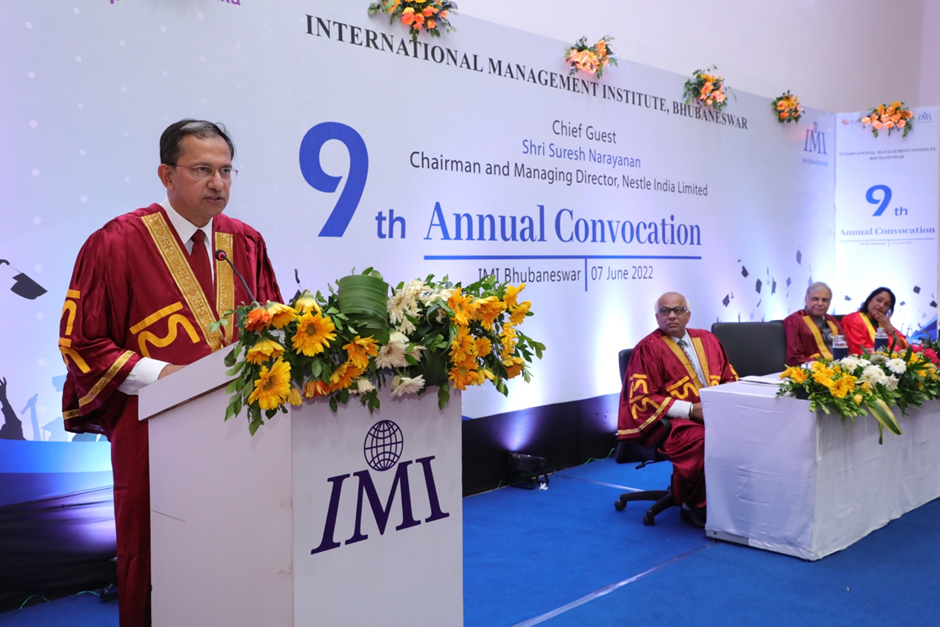The 6th International Conference on “Global Business Environment” hosted by International Management Institute, Bhubaneswar, and EGADE Business School, Mexico, concludes successfully
16th December 2020,
Wednesday: Bhubaneswar’s
top-ranking business school, International Management Institute (IMI) along
with a remarkable university, EGADE Business School, Mexico City, Mexico,
recently held its 6th edition of International Conference on “Global
Business Environment” with the theme – “Disruptions in Business and Management
Practices: Causes, Conflicts, and Control”, which came to a successful
conclusion on Saturday, 12th December 2020, after a two-day
insightful event.
The conference was divided into 9 technical sessions, coupled with 65 types of research, which were split and presented across two engaging days. The event was commenced by Prof. Manit Mishra, following which, Prof. Ramesh Behl – Director of IMI Bhubaneswar, took over to welcome the guests, presenters, management authorities, and most importantly, students. In his address, he covered topics of ongoing matters, including the COVID-19 pandemic and tech disruptions caused due to it; its effect on political, social, and personal life. He then shed light on the current happenings at IMI – B and how the institute’s network and connections with industry specialists and multinationals have proven to be of use to all the recipients – the college, faculty, and students. What followed this session was the release of a volume jointly edited by Prof. Behl, Director, IMI
B and Dr Rajgopal – Professor at EGADE Business School, Mexico titled- Entrepreneurship and Regional Development- Analyzing growth Models in Emerging Markets. This edited the volume brings together research on symbiotic themes of entrepreneurship, resource planning, and regional development and their impact on global-local business imperatives.Dr Rajgopal, in his speech, laid
focus on the subject of business systems and its three types; mainly,
standardization & hybridization, business analytics, and design view with
triadic elements. His address also highlighted the abstracts submitted and
accepted at the Conference and information on HUL’s ambitious project, Shakti,
which began in 2001, with an aim to empower rural women. In continuation of
this, Dr Rajgopal brought into notice the concept of welfare marketing and
quoted his view by saying, “Innovation and disruption are going to be the local
ecosystem. Disruption isn’t always negative – it can have positive outcomes
too.” Further speaking on the event, he added, “The goal of conducting this
conference was to bring together students to share the best practices, engage
in discussions related to common world issues, and enrich their educational
experience, which according to me, has been met successfully.”
The second day of the conference
commenced with a technical session spearheaded by Mr Pronobesh Banerjee on the general topic of “compromise” that put into spotlight relevant discussions on
numerical cognition and choice, polarization effect, and different attributes.
The day proceeded with speeches by Ms Monika Nagar on “the study of the impact
of the adoption of the biometric technological authentication system in the organization”, Ms Sarika Singh on “factors influencing data sharing intention
for human resource analytics”, Ms Sharanika Dhal on “competencies of nursing
professionals during a pandemic”, and Ms Karishma Trivedi on “the moderating
role of improvisation capabilities with innovation performance and knowledge
management”.
What followed was a series of sessions hosted by some of the most renowned industry specialists who touched upon various topics relating to financial systems, economic growth, omnichannel retailing, and portfolio diversification among others. As the day came to end, one of the final speeches was led by Prof. Rahul Gupta Choudhury, who addressed a sensitive yet very crucial matter of interest, migrant labourers, and the nature of the workforce in India. In compliance with the research he conducted, he observed and quoted, “India is blessed with an active the workforce of 500 million, of which, there’s a count of staggering 150 million migrant workers. What has held the country back is the lack of infrastructure, traditional methods, environmental disasters, lack of security, and population pressure, which individually as well as together makes agriculture non-profitable. The solution for these setbacks lies in making a change in the mindset, maintaining a comprehensive database, and offering training and reskilling existing employees.”
Through this International
Conference, IMI and EGADE envision that aspirants will get exposure to a robust
pool of information and direction for the career.






Aah
ReplyDelete